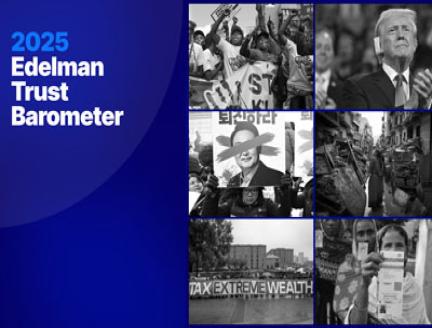2021 Edelman Trust Barometer reveals a strong mandate for NGOs and business to drive positive change in Kenya
NGOs and business are the most trusted institutions in the country
Trust in NGOs in Kenya is well ahead of the global average
March 2, 2021 – NAIROBI – The 2021 Edelman Trust Barometer reveals that Kenyans trust NGOs and business more than other institutions, and are looking to their own employers to provide them with credible information and to be a force for good.
“With the pandemic having put trust to the test, Kenyans are placing their trust in NGOs and business to help the country through the Covid-19 crisis and to drive positive change going forward,” says Jordan Rittenberry, CEO of Edelman Africa.
The 21st annual Edelman Trust Barometer – which measures trust as a function of competence and ethics – is based on a nationally representative survey conducted through October and November 2020. It reveals that trust in NGOs, business and government has increased over the past year as these institutions worked to safeguard society. On the other hand, trust in the media edged marginally lower on concerns about misinformation.
NGOs and business are firmly in the ‘trusted’ category, while trust in the media is ‘neutral’ and government is ‘distrusted’.
At 74 points, NGOs are easily the most trusted institution in Kenya. In fact, of the 28 global markets in which Edelman measures trust, only Indian citizens place more trust in their non-profit organisations.
Kenyans also put more trust in business than the global average. And although government remains distrusted, it scores higher than South Africa and Nigeria’s governments.
The vote of confidence in NGOs and business follows numerous initiatives by the private sector and civil society organisations aimed at protecting employees during the pandemic, assisting customers, and safeguarding local communities.
Uncertainty raises the need for action
“The uncertainty brought on by the pandemic has further raised fears and increased the urgency to address foundational problems and deepening inequities in Kenya and other markets,” Rittenberry says. “As is the case in South Africa and Nigeria, job security has emerged as an even greater concern than contracting Covid-19.”
The survey shows that Kenyans believe the crisis has made the country more unequal. Nearly two-thirds of respondents say their workforce has shrunk amid the pandemic. Against this backdrop, Kenyans want their employers to offer upskilling and training opportunities, while also ensuring the safety of their workplaces.
With most respondents holding the belief that journalists are purposefully trying to mislead them, employers are also seen as the most reliable source of information.
“This means that all organisations have a responsibility to keep their employees informed by providing them with trustworthy information in the midst of a raging global ‘infodemic’, Rittenberry says.
Outside of the workplace, Kenyans are looking to CEOs to step in and take the lead on change. As many as 97% of respondents in the country want CEOs to publicly speak out on issues such as automation and the impact of the pandemic.
There is also an increased urgency to improve the country’s healthcare and education systems, and to tackle poverty.
Meanwhile, two-thirds of Kenyans are willing to get vaccinated within a year. This is slightly ahead of the global average – and ahead of South Africa and Nigeria – but below the 70% threshold that scientists believe is needed for herd immunity.
“As the focus shifts to the Covid-19 vaccination programme and life after the pandemic, government, business and NGOs will need to work more closely together than ever before to build trust and improve the lives of the country’s citizens,” Rittenberry says.





